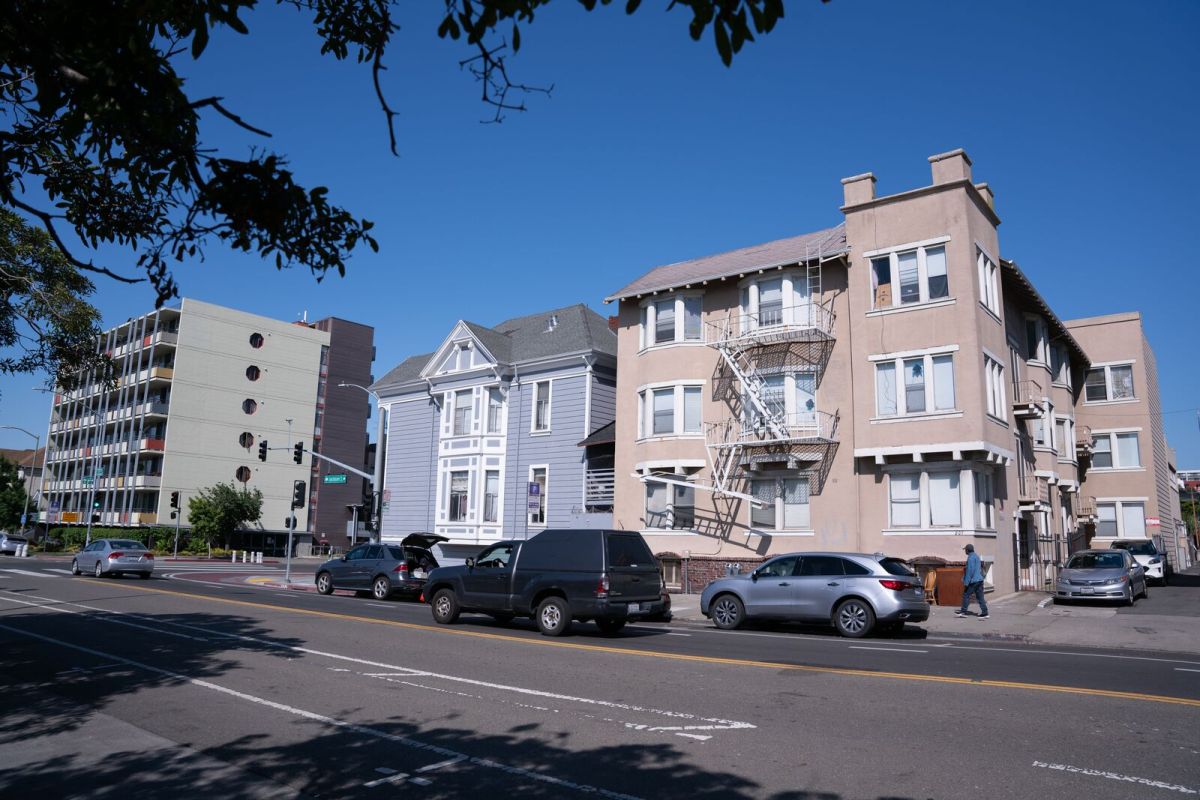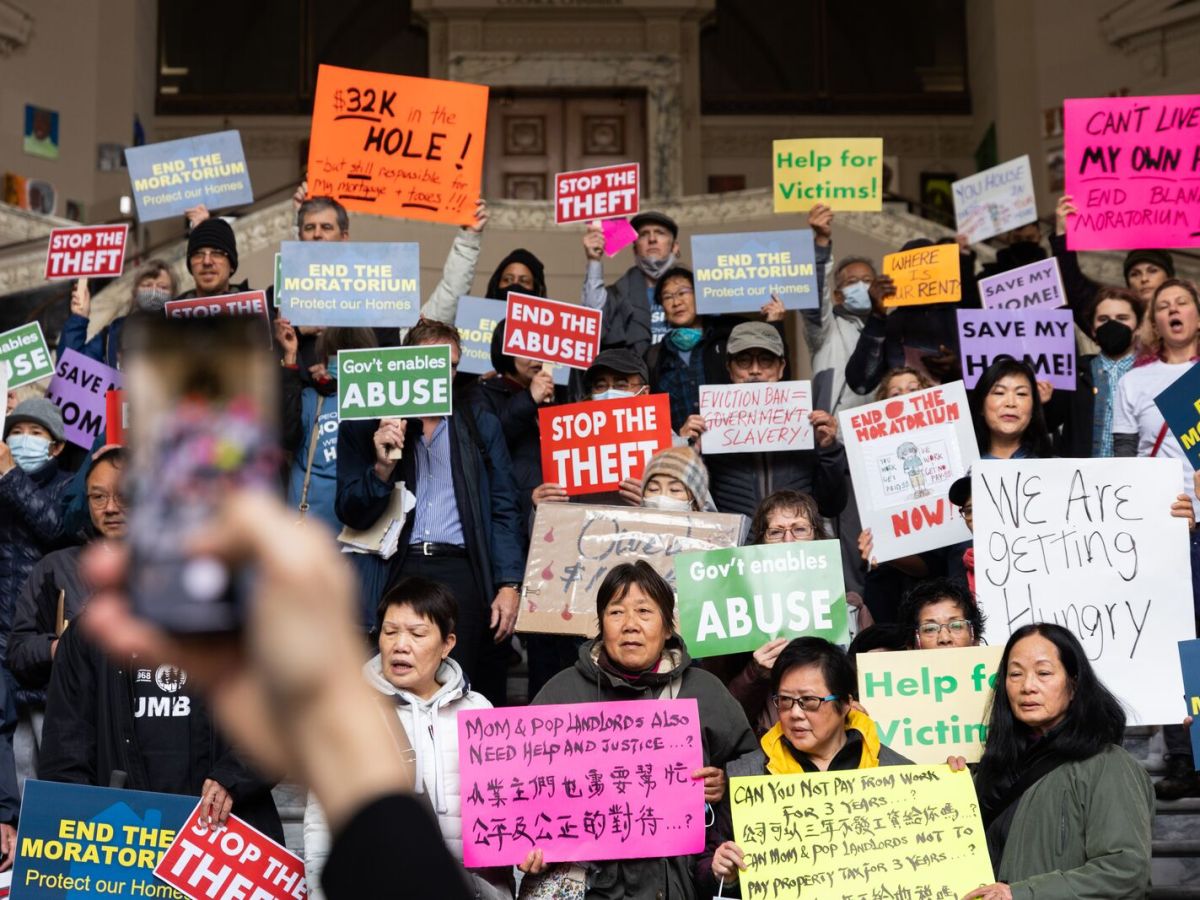After more than three years of protections, protests, and pandemic, Oakland’s COVID-19 eviction moratorium has come to an end.
The policy, first adopted in March 2020, expired Saturday night, allowing evictions to resume throughout the city. The moratorium had prohibited nearly all evictions, with exemptions if the tenant was threatening someone’s health or safety or if the landlord wanted to take the building off the rental market.
Some Oakland property owners, who’d increasingly called for the end of Oakland’s moratorium, are relieved at the full restoration of their rights.
Tenant advocates, concerned about a rise in homelessness, are bracing for another “eviction wave” like the rapid increase seen in nearby cities after the countywide moratorium expired at the end of April.
“I have never seen the number of walk-ins, the flood of new lawsuits, and the level of desperation that we are seeing right now,” said attorney Peter Selawsky, who’s worked for 11 years at the Eviction Defense Center, which provides free legal services to renters.
“We currently have walk-in potential clients lined up outside our door every day,” he said.
Oakland’s moratorium, like similar legislation throughout the Bay Area, was a response to a deadly virus that prompted an unprecedented increase in unemployment. Some households experienced difficulty paying their bills for the first time, and other families that were already struggling to make rent were thrust into an even more precarious position. The temporary ban, later extended multiple times, was meant to keep Oakland residents housed and safe during the crisis.
It worked. Prior to the pandemic, property owners in Alameda County typically filed 300 to 400 eviction lawsuits each month. After the moratoriums were adopted, that number never reached higher than 100 per month until the county moratorium expired, according to superior court data obtained by The Oaklandside.
Eviction cases skyrocketed after the county’s moratorium expired at the end of April. In May, landlords filed 557 lawsuits attempting to evict residential tenants in the county. In June, they filed 772.
Twelve days into July, it looked like that number was beginning to taper off, with only 168 lawsuits so far. But Oakland, along with Berkeley and San Leandro, is one of three cities that have kept their own moratoriums in place longer. Because it’s the most populous city in the county, tenant advocates are concerned that Oakland’s expiration will lead to another surge in eviction attempts.
Selawsky noted that prior to the pandemic, a majority of eviction filings were in Oakland.
Some property owners say the sunsetting of the moratorium is overdue.
“I’m glad it’s over for a significant number of very small property owners, like me,” said Oakland landlord Michael Loeb.
Loeb, a plaintiff in a lawsuit that challenged the Oakland and Alameda County moratoriums, bought his first rental properties—two adjacent condos—in 2020, with the intention of joining them and moving in himself. He’d recently sold his house after his wife died and then had been asked to leave his own rental unit. He negotiated a move-out payment with the tenant of one of the units, but he alleges that the other declined to accept his significant offer.
Typically, owner move-in evictions are permitted in Oakland with relocation fees, but the moratorium prevented this one.
Andrew Zacks, a lawyer representing the landlords in that lawsuit, blamed the recent spike in evictions on “overly broad, draconian moratoriums that have been allowed to remain in place for far longer than justified by the actual impact of the pandemic.” Property owners are owed massive amounts of rent money that went unpaid during the moratorium, he said.
The city of Oakland has launched an “educational campaign” to inform tenants and landlords of their rights as the moratorium expires—noting, for one, that nobody can ever be evicted over unpaid rent that became due between March 2020 and July 14 if they experienced a COVID-related financial hardship. The property owner can, however, take them to court for that money.
Even without the moratorium, Oakland has a permanent Just Cause for Eviction policy that says landlords can only pursue evictions for certain reasons, like failure to pay rent, substantial damage to the property, or an owner move-in.
“This moratorium was effective in giving renters the protection they needed during an incredibly challenging time,” said Mayor Sheng Thao in a statement, noting that she’s a renter herself. “Now that it’s winding down the City and county have resources in place to protect renters, including funding for legal aid organizations that support renters facing eviction.”
Oakland’s Rent Adjustment Program is hosting a series of workshops at the end of the moratorium, some designed for tenants and others for property owners, throughout the summer and fall.
The Oakland Tenants Union, a grassroots group supporting renters, said the city needs to do more to make sure tenants’ rights aren’t violated. James Vann, co-founder of the organization, told The Oaklandside that he’s hearing of cases where landlords are “taking advantage of the coming changes.”
“In the last 24 hours, OTU has received several calls from puzzled tenants regarding illegal eviction notices, lock-outs, rekeyed locks, theft and disposal of tenants’ property, excessive rent increases, and suits for thousands of dollars in allegedly owed rent amounts,” he said in an email Friday. “There will be a difficult period ahead as tenants and advocates attempt to ride out the many challenges.”




